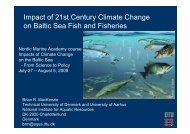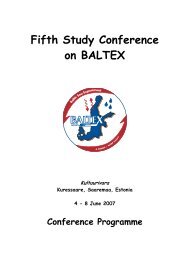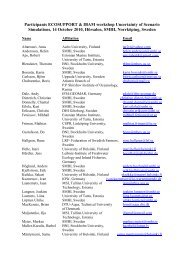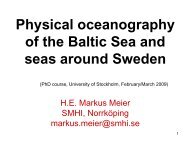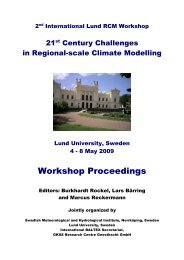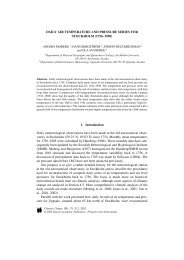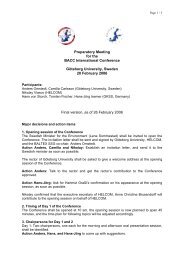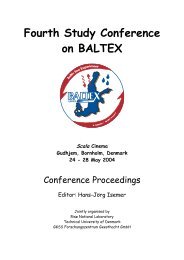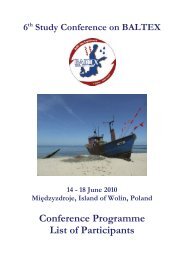BALTEX Phase II 2003 â 2012. Science Framework and ...
BALTEX Phase II 2003 â 2012. Science Framework and ...
BALTEX Phase II 2003 â 2012. Science Framework and ...
Create successful ePaper yourself
Turn your PDF publications into a flip-book with our unique Google optimized e-Paper software.
<strong>BALTEX</strong> <strong>Phase</strong> <strong>II</strong> <strong>Science</strong> <strong>Framework</strong> <strong>and</strong> Implementation Strategy 49<br />
5. Strengthened Interaction with Decision Makers<br />
As global change research results are expected to be policy-relevant, <strong>BALTEX</strong> <strong>Phase</strong> <strong>II</strong> research goals<br />
should take advantage of stakeholder involvement from the beginning. It is our wish to establish at<br />
least one working group with members from both governmental <strong>and</strong> non-governmental organisations.<br />
The selection of the themes is driven by the societal needs <strong>and</strong> its ordering does not give any priority.<br />
The working group should start activities immediately after the adoption of this strategy. The new<br />
<strong>BALTEX</strong> <strong>Phase</strong> <strong>II</strong> goals <strong>and</strong> the related implementation measures are new approaches for the Baltic<br />
Sea basin, <strong>and</strong> the suggested stakeholder involvement can also be seen as an additional motivation for<br />
trans-disciplinary research in the fields covered.<br />
5.1. Interaction with Governmental Organisations<br />
The impact of the scientific work on society can be viewed, in a simplified fashion, as a chain of<br />
events starting from basic research programs, leading to applications by service organisations <strong>and</strong><br />
finally ending as benefits for the society <strong>and</strong> economical life. The governmental organisations<br />
including research <strong>and</strong> service institutes may thus be considered as stakeholders from the point of<br />
view of academic research programs, such as <strong>BALTEX</strong>. As the governmental institutes, for example<br />
national Hydro-meteorological Services, often perform research of their own, they can also be<br />
considered as partners of the research programs.<br />
The governmental organisations thus have at least two different roles to play:<br />
i. To serve the whole society with information <strong>and</strong> facts in the area of their responsibility;<br />
ii. to develop the services in their field of competence.<br />
As a first step, dedicated workshops for stakeholders will be organized with the aim to acquire a<br />
common underst<strong>and</strong>ing of these roles of the governmental organisations in the context of the<br />
<strong>BALTEX</strong> programme. The focus of these discussions should be on common responsibilities <strong>and</strong><br />
opportunities. Examples include the cooperation with respect to an assessment of climate variability<br />
<strong>and</strong> change for the Baltic Sea basin, background material on the “National Communication on Climate<br />
Change”, a common view on quality assurance of the reporting to the Baltic Marine Environment<br />
Protection Commission (HELCOM) <strong>and</strong> the European Environment Agency (EEA), the common use<br />
of large investments in model systems, <strong>and</strong> data policy.<br />
5.1.1. Suggested Activities<br />
The governmental agencies <strong>and</strong> institutes are encouraged to compile their common needs to address<br />
the <strong>BALTEX</strong> community. The scope may even be broader <strong>and</strong> wider than outlined in the <strong>BALTEX</strong><br />
<strong>Phase</strong> <strong>II</strong> <strong>Science</strong> Plan. For instance, not only the impacts of climate change but also how to adapt to<br />
the envisaged impacts, tailored with relevant risk analyses, could be listed as needs. Some suggestions<br />
are detailed in section 5.3, see below.



